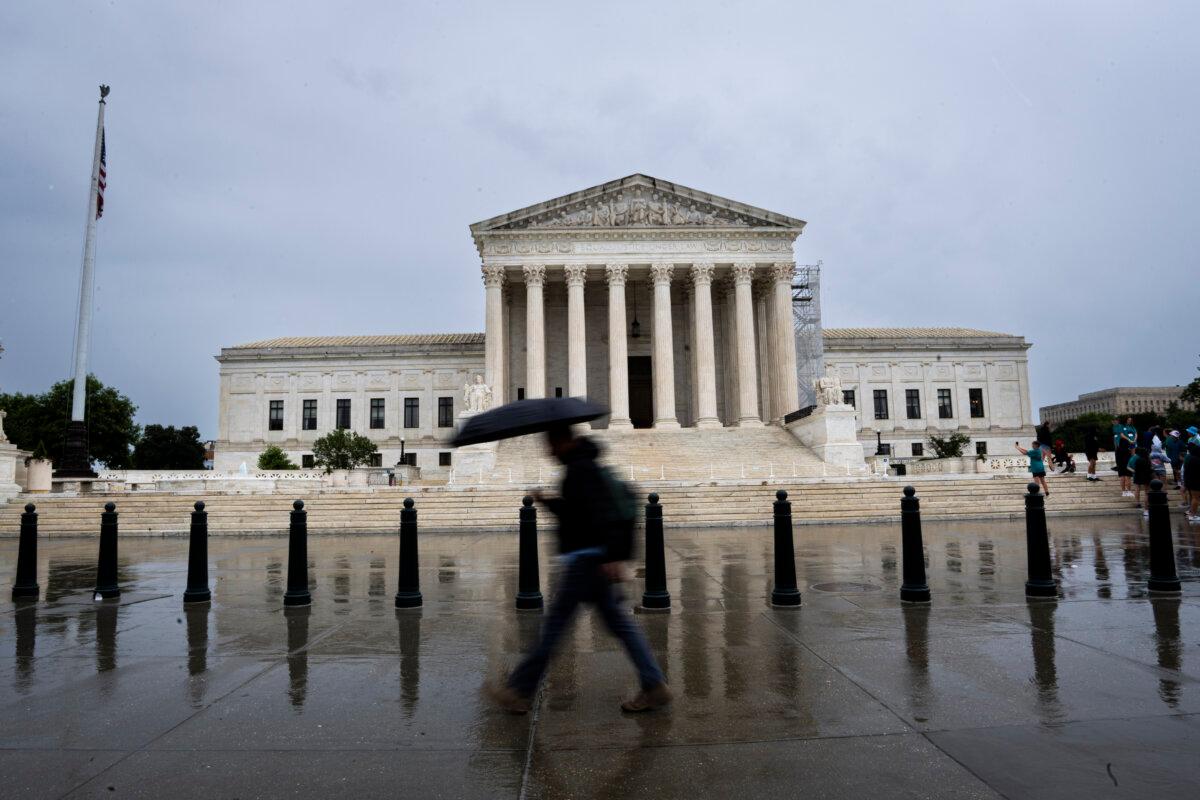The Supreme Court’s current composition has allowed for several key rulings praised by conservatives.
President Joe Biden said Wednesday that whoever wins the presidential election in November will likely have the opportunity to appoint two new Supreme Court justices while hinting that if he emerges victorious, he’ll push to appoint “really progressive” ones.
“The next president, they’re going to be able to appoint a couple of justices, and I’ll be damned,” President Biden said at the rally. “If in fact we’re able to change some of the justices when they retire and put in really progressive judges like we’ve always had, tell me that won’t change your life.”
The Supreme Court’s current composition has allowed for several key rulings praised by conservatives, including the landmark 2022 decision in Dobbs v. Jackson Women’s Health, which effectively overturned Roe v. Wade and allowed states to decide their own abortion policies. Another was a decision in 2023 that struck down the use of racially discriminatory admissions policies at American colleges, ending the use of so-called affirmative action programs in higher education.
For his part, President Trump has expressed satisfaction with his Supreme Court appointments and their jurisprudence, telling attendees at a summit hosted by the Moms for Liberty campaign group in Philadelphia last summer that he would relish the opportunity to appoint more.
“You know many presidents never get the opportunity to appoint a Supreme Court justice. I had three, they are gold,” he said, adding that Democrats “are not happy about that.”
“And maybe we’ll get three or four more. Can you imagine? Let’s have seven. Let’s have seven or eight or maybe even nine,” he added.
Court-Packing
President Biden established a commission to explore ideas like adding seats to the Supreme Court or imposing term limits on justices, with the commission failing to back court-packing in its final report.
Besides Justice Barrett, President Trump successfully nominated two other Supreme Court justices—Brett Kavanaugh and Neil Gorsuch.
The U.S. Constitution does not require that nine justices sit on the Supreme Court, although that number has stood for more than a century. The Democrat court-packing bill remains stalled in Congress.
President Trump left the White House in January 2021, having appointed over 200 judges to the federal bench, including nearly as many federal appeals court judges during his four-year term as President Obama appointed over the course of eight years.

Conservative Justices Issue Warning
Two of the Supreme Court’s conservative members—Justices Clarence Thomas and Samuel Alito—recently issued warnings about the state of affairs in present-day America.
In separate speeches in mid-May, the justices warned that fundamental rights were under assault in America while the nation’s capital was becoming a place where cancel culture runs rampant.
Justice Alito warned graduates at a Catholic college in Ohio that freedom of speech and religion were both being assailed in the country while expressing hope that young people would take up the mantle and fight for positive change.
He also raised the issue of freedom of religion being “imperiled,” noting that graduates may find themselves in jobs or social settings where they will be pressured to renounce their beliefs or adopt ones they find morally objectionable.
“It will be up to you to stand firm,” he said.
Justice Thomas, who has faced heavy fire from Democrats who accuse him of skirting disclosure rules and of being too cozy with wealthy Republicans, spoke at an event in Alabama.
Asked about what it’s like to work “in a world that seems meanspirited,” Justice Thomas acknowledged that he’s faced “challenges.”
“We’re in a world and we—certainly my wife and I the last two or three years it’s been—just the nastiness and the lies, it’s just incredible,” he said, adding that Washington was becoming a “hideous” place where cancel culture runs rampant.
By contrast, he said America beyond the Beltway was a place where regular people “don’t pride themselves on doing harmful things.”
Justice Thomas also expressed concern that court writings have become inaccessible to the average person, engendering a sense of alienation.










